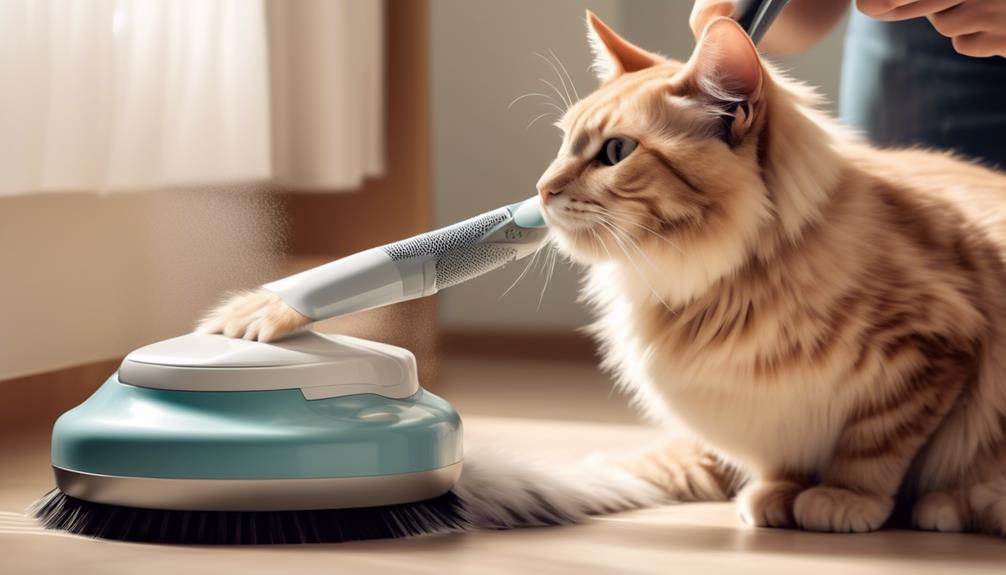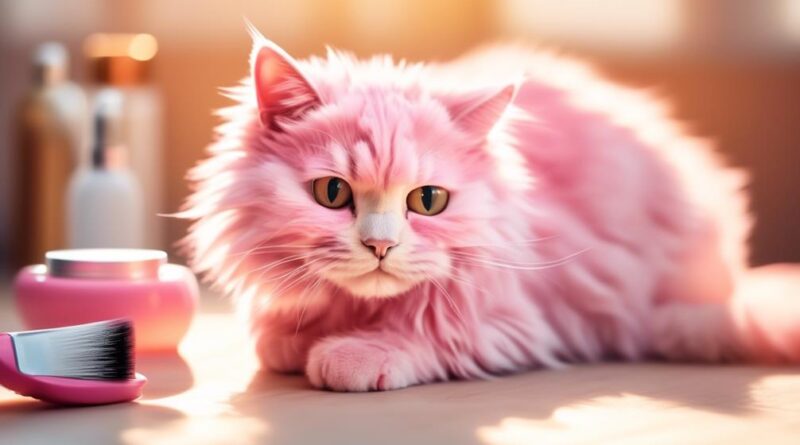11 Essential Tips for Cat Fur and Skin Health
Keeping your cat's fur and skin in top-notch condition is crucial for their overall well-being. You may think you're doing everything you can, but there are 11 essential tips that you might not have considered yet.
These tips are not just about making your cat look good; they are about ensuring that your feline friend is healthy and happy. From diet to grooming and everything in between, these tips will help you provide the best care for your furry companion.
Proper Nutrition
To maintain your cat's fur and skin health, provide a balanced diet rich in essential nutrients and high-quality protein. This is crucial for ensuring your feline friend's overall well-being. Nutritional balance is key, and you can achieve this by offering a high-quality cat food that meets the Association of American Feed Control Officials (AAFCO) standards. Look for cat food that lists meat, poultry, or fish as the first ingredient, indicating a good source of protein. Additionally, ensure that the food contains essential nutrients such as omega-3 fatty acids and vitamins A and E, which are beneficial for your cat's fur and skin health.
In some cases, dietary supplements may be necessary to support your cat's fur and skin health. Omega-3 fatty acids, for example, can be beneficial in maintaining a healthy coat and skin. You can find these supplements in the form of fish oil or flaxseed oil, which can be added to your cat's food. However, it's important to consult your veterinarian before introducing any supplements to your cat's diet, as they can advise you on the correct dosage and whether the supplements are suitable for your cat.
Regular Grooming
Regular grooming is essential for maintaining your cat's fur and skin health. Coat brushing is a crucial part of grooming your cat. It not only helps to remove dirt and loose hair but also stimulates the skin and helps distribute natural oils, keeping the coat healthy and shiny. For short-haired cats, a weekly brushing is usually sufficient, while long-haired cats may require daily brushing to prevent matting and tangling. Regular brushing also reduces shedding and minimizes the formation of hairballs, promoting overall skin health.
Shedding control is another important aspect of regular grooming. Especially during seasonal changes, cats tend to shed more profusely. To manage this, consistent brushing with a suitable grooming tool can significantly reduce the amount of loose fur in your home and prevent matting in your cat's coat. Additionally, it can lessen the likelihood of your cat ingesting excessive hair during self-grooming, which can lead to digestive issues.
Hydration
As you attend to your cat's grooming needs, ensuring proper hydration is essential for maintaining their fur and skin health. Cats, like humans, require adequate hydration to support their overall well-being, including the condition of their fur and skin. Preventing dehydration is crucial, especially during the summer heat when cats are more prone to losing fluids through panting and sweating through their paw pads.
Make sure your cat has access to clean, fresh water at all times, and consider placing multiple water bowls around your home to encourage regular drinking.
In addition to preventing dehydration, moisturizing your cat's skin is important, particularly in dry climates. Just as humans experience dry, itchy skin in arid conditions, cats can also suffer from skin issues due to lack of moisture. To help combat this, consider using a veterinarian-approved moisturizing spray or wipe specifically designed for cats. These products can help replenish essential oils and moisture in your cat's skin, promoting a healthy and lustrous coat.
During the hot summer months, pay extra attention to your cat's water intake and skin condition. Keep an eye out for any signs of dehydration, such as sunken eyes, lethargy, or dry, tacky gums. By being proactive about hydration and skin moisture, you can contribute to your cat's overall fur and skin health, ensuring they stay comfortable and happy year-round.
Parasite Control
Keep your cat protected from parasites by regularly administering veterinarian-recommended preventative treatments. Parasites such as fleas, ticks, mites, and lice can cause discomfort and skin issues for your feline friend. Here are some essential tips for parasite control:
- Flea Prevention: Use veterinarian-recommended flea prevention products to keep these pesky parasites at bay. Fleas can cause skin irritation, hair loss, and even transmit diseases to your cat. Regular treatment is essential for effective flea control.
- Tick Control: Ticks can transmit serious illnesses such as Lyme disease and Ehrlichiosis to your cat. Use tick control products as recommended by your veterinarian, especially if your cat spends time outdoors. Regularly check your cat for ticks, particularly after outdoor adventures.
- Mite Management and Lice Treatment: Mites and lice can cause intense itching, skin inflammation, and discomfort for your cat. Your veterinarian can recommend suitable treatments to manage mites and treat lice infestations. Prompt treatment is crucial to prevent secondary skin infections and alleviate your cat's discomfort.
Stress Management
To help maintain your cat's fur and skin health, it's important to understand and address potential sources of stress in your feline friend's environment. Cats can experience stress from various factors such as changes in routine, new pets in the household, or even boredom. Stress can manifest in cats through excessive grooming, skin issues, or changes in fur texture.
To manage your cat's stress effectively, consider incorporating relaxation techniques and mental stimulation into their daily routine. This can include providing interactive toys, puzzle feeders, and engaging in regular play therapy sessions. Environmental enrichment is also crucial in reducing stress levels. Create a stimulating environment by adding perches near windows for bird watching, incorporating scratching posts, and providing hiding spots for your cat to retreat to.
Mental stimulation is essential for your cat's well-being, as it helps prevent boredom and reduces stress. You can engage your cat in activities such as clicker training, where they can learn new tricks and commands. Additionally, providing a variety of toys that encourage natural hunting and pouncing behaviors can mentally stimulate your cat. Play therapy, including interactive play sessions with wand toys or laser pointers, can help alleviate stress and anxiety.
Sun Protection
Protect your cat from harmful sun exposure by providing shaded areas and limiting their time in direct sunlight. Cats can easily get sunburned, especially those with light-colored fur or thin coats. Here are some essential tips for sun protection:
- Sunscreen application: Just like humans, cats can benefit from sunscreen, especially on their ears, nose, and other exposed areas. Use a pet-safe sunscreen with an SPF of 30 or higher and apply it 15-30 minutes before they go outside.
- Shade seeking behavior: Cats are smart and will often seek out shaded areas on their own. Ensure that there are plenty of shady spots in your yard or near windows so your cat can avoid direct sunlight when outdoors or indoors.
- Protective clothing and accessories: If your cat is willing to tolerate it, consider investing in lightweight, protective clothing or accessories designed for cats to shield them from the sun's rays.
These simple measures can significantly reduce the risk of sunburn and skin damage in your feline friend. Always monitor your cat for any signs of sunburn, such as red or inflamed skin, and consult your veterinarian if you notice any concerning symptoms.
Allergen Management

Considering potential allergens in your home environment, regularly cleaning your cat's bedding, toys, and living areas can help reduce allergen exposure for both you and your feline companion. In addition to cleaning, using air purifiers equipped with HEPA filters can help trap airborne allergens such as pet dander and pollen, thereby improving the air quality in your home. Place air purifiers in commonly used areas to maximize their effectiveness in reducing allergens.
When it comes to grooming and bathing your cat, using hypoallergenic products can be beneficial. These products are formulated to be less irritating to sensitive skin and can help reduce the amount of allergens present in your cat's fur. Regular grooming with hypoallergenic wipes or shampoos can help manage allergens and maintain your cat's skin and coat health.
Incorporating hypoallergenic bedding for your cat can also aid in managing allergens. Look for bedding materials that are designed to resist allergen buildup and are easy to clean. Wash your cat's bedding frequently with gentle, hypoallergenic detergents to minimize allergen accumulation.
Veterinary Care
Regular veterinary check-ups are essential for maintaining your cat's overall health and addressing any potential skin or fur-related concerns that may arise. Preventive care is crucial in ensuring your cat's well-being and can help identify any skin or fur issues early on. Additionally, dental health is an integral part of your cat's overall health, as dental problems can lead to skin issues if left untreated.
Here are some key reasons why veterinary care is essential for your cat's fur and skin health:
- Preventive Care: Regular check-ups allow your veterinarian to assess your cat's overall health and detect any potential skin or fur-related issues before they escalate. This proactive approach can help prevent more serious health concerns down the road.
- Dental Health: Your cat's dental health is closely linked to its skin and fur health. Dental problems, such as gum disease or tooth decay, can lead to inflammation and infections that may affect your cat's skin and fur. Regular dental check-ups and cleanings can help prevent these issues and contribute to your cat's overall well-being.
- Early Intervention: Veterinary check-ups provide an opportunity for early intervention if any skin or fur-related concerns are identified. Early diagnosis and treatment can prevent discomfort for your cat and may help avoid more serious health complications.
Frequently Asked Questions
Can I Use Human Shampoo on My Cat for Grooming?
You should avoid using human shampoo on your cat for grooming. It can cause skin irritation and dryness. Look for cat-specific shampoos or consult your vet for safe shampoo alternatives for cat grooming.
How Can I Tell if My Cat Is Stressed and What Can I Do to Help?
If your cat is stressed, look for signs like excessive hiding or aggression. Calm them by providing a safe space, interactive toys, and regular playtime. Create a stress-free environment with soothing music and pheromone diffusers.
Are There Any Natural Remedies for Flea and Tick Prevention?
For flea and tick prevention, you can try natural remedies like essential oils, herbal treatments, and homeopathic options. These chemical-free solutions are gentle on your cat's skin and can be effective in keeping pests at bay.
Can I Give My Cat Coconut Oil for a Healthy Coat?
Yes, you can give your cat coconut oil for a healthy coat. It has dietary benefits and can be used in grooming techniques. However, be cautious of potential risks and consider alternative treatments for your cat's fur and skin health.
Are There Any Specific Skin Conditions I Should Look Out for in My Cat?
You should keep an eye out for feline dermatitis, allergies, skin infections, dry skin, feline acne, ringworm, mange, hot spots, skin tumors, and skin cancer. Regularly check your cat's skin for any abnormalities.
Conclusion
Now that you have the essential tips for your cat's fur and skin health, you can ensure that your furry friend stays happy and healthy.
By providing proper nutrition, regular grooming, hydration, parasite control, stress management, sun protection, allergen management, and veterinary care, you can keep your cat's skin and fur in top condition.
Remember to always consult with your veterinarian for personalized advice and care for your cat.
